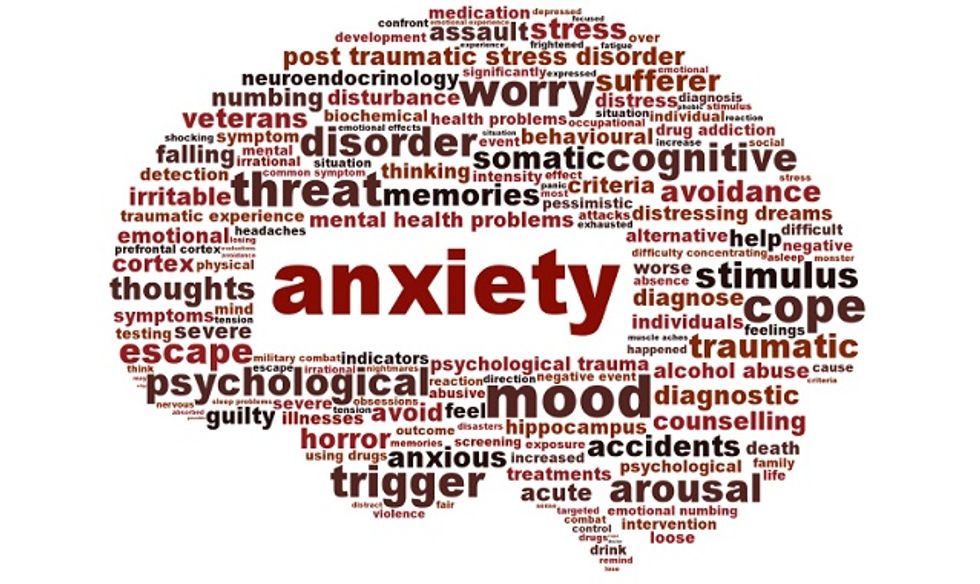It's a beautiful day: the sun is out, the temperature is perfect, and the birds are chirping. It seems like a normal day of school,
How menacing does that sound? This is what anxiety looks like: Constantly worrying when nothing is wrong. Some people experience this
How A Person With Anxiety Feels
First off, many people don't know that anxiety is a physical problem as well as a psychological problem. "Anxiety is a negative mood state characterized by bodily symptoms of physical tension and by apprehension about the future, or a physiological response originating in the brain and reflected in elevated heart rate and muscle tension" (Barlow, Durand, 123). I'm sure all of us have felt this before, and in the right doses, anxiety is healthy for us. A good example is anxiety before finals, which drives us to do our best. However, when this anxiety becomes constant or chronic, you may have an anxiety disorder. An example is when anxiety lasts throughout the school year when you have light work and you are doing very well.
Savannah is a college student who has GAD. Despite being diagnosed with depression and anxiety at age 16, she has experienced anxiety as young as age 4. "I remember being as young as 4 years old, sobbing in bed in the middle of the night contemplating my many "mistakes" and how my life was going to turn out as a result of them," Savannah wrote. "I also get paranoid like I'm going to flunk school, die alone, or never be happy." Many people also experience this type of uneasiness, like Savannah has. Other symptoms of anxiety are muscle tension, which could lead to physical fatigue. This, plus sleep disturbances and overthinking, cause people with anxiety to be exhausted most of the time.
What An Anxiety Attack Feels Like
"Have you ever been dozing off for a nap, but then jolt awake because you felt like you were falling for a split second? An anxiety attack is exactly like that feeling in your chest, but it can go on for hours, or even days." This is what Savannah described as an anxiety attack. Sounds pretty terrible doesn't it? No matter how many times a person with an anxiety attack tells themselves to calm down and that there is nothing wrong, they still have the feeling. Chest pains, racing heart beat, sweating, shakiness, dizziness, and nausea are also symptoms of an anxiety attack. It is a serious detriment to their everyday activities, like school, work, and even hanging out with friends, which should be a relaxing time!
Non-Medicated Coping Methods For People With Anxiety
So how does one deal with constant anxiety on a day-to-day basis? Well, some people go through the day trying to ignore it with little success in getting rid of it, others self-medicate. However, there are healthier and more beneficial ways to deal with constant anxiety. Although it won't cure anxiety, it will help one cope with this problem.
Meditation! This is a great way to help bring one's mind to ease. Meditation takes some practice, but it is an excellent way to help calm and refocus the mind. Picking a quiet place in your house and listening to calming music or being in complete silence is the best.
When anxious, another helpful strategy is to touch your surroundings. This is what Savannah's therapist told her to do. "I thought it sounded ridiculous, but honestly, it brings me back to reality. Knowing my surroundings and literally feeling that I'm stable is a powerful argument against worries," she wrote. She also mentioned that keeping the brain stimulated is a great way to cope with anxiety. For example, reading, writing, doing puzzles, and maybe even playing a video game.
Exercise is also a wonderful coping mechanism. It doesn't have to be strenuous exercise to work. Just taking a simple walk through nature could calm anxiety. It's much better to "walk it off" than sit and think about it. However, exercise is not for everyone with anxiety, as it could heighten their chances of an anxiety attack.
For other options, including Cognitive Behavioral Therapy or medication, go to a doctor. By no means are these options able to treat anxiety and by no means am I a doctor! So for more information on the diagnosing of anxiety and treatment options, please see a psychologist or a psychiatrist.
Bringing Awareness To Anxiety
Anxiety is a serious issue for many people. It disrupts their daily lives and makes them a living hell. Unfortunately, people can't put their lives on hold for this issue, especially because it could go on for several years. I want to bring awareness to anxiety so that more people understand that it is a real struggle for people out there. If you know someone with anxiety, or you have it, understand that it isn't their fault and sometimes they can't control when they are anxious or when they have an anxiety attack.
Be aware and care!
Citations
Durand, V. Mark. "Anxiety, Trauma- and Stressor-Related, and Obsessive-Compulsive and Related Disorders." Abnormal Psychology. By David H. Barlow. 7th ed. Stamford: Cengage Learning, 2015. N. pag. Print.
Savannah. Message to the author. 4 July 2015. E-mail.
















